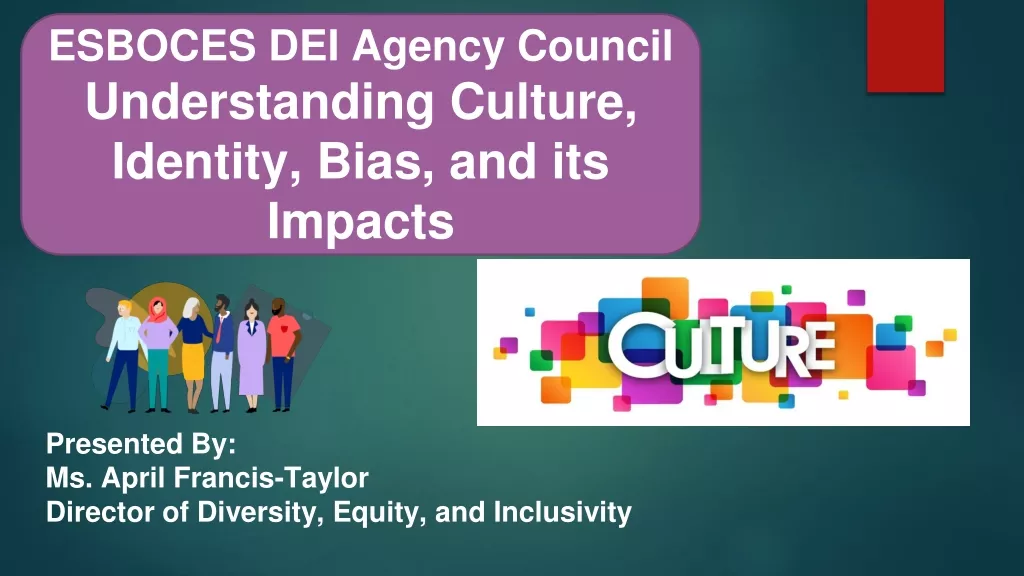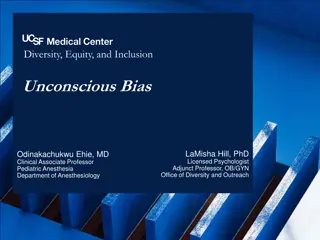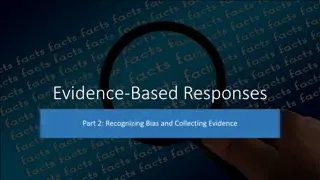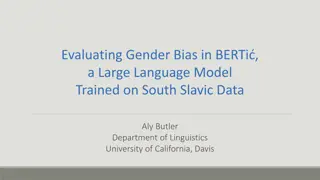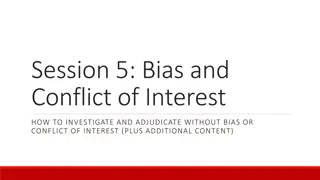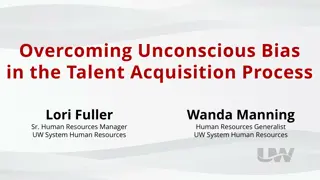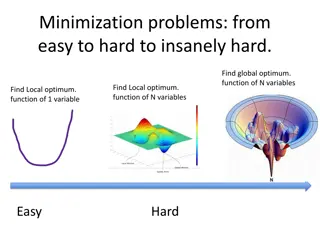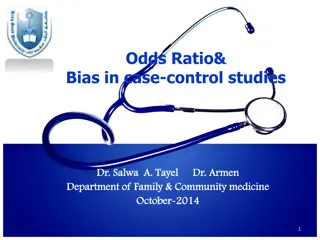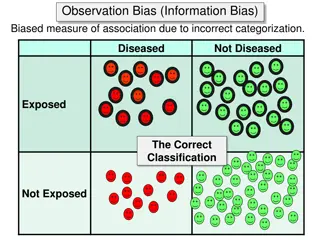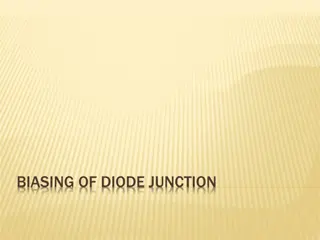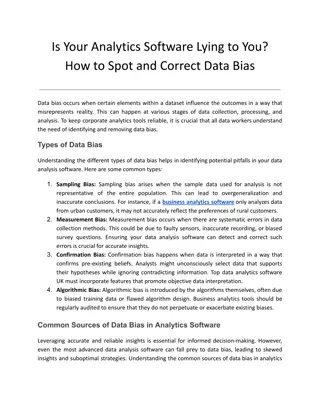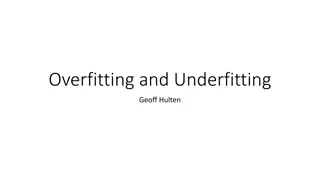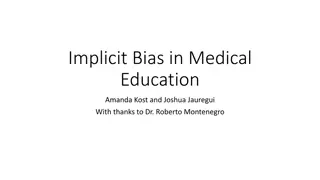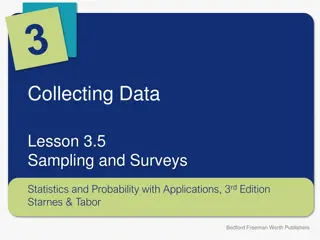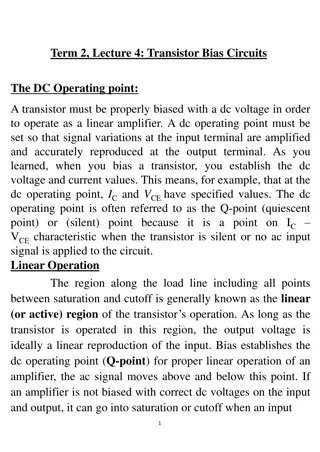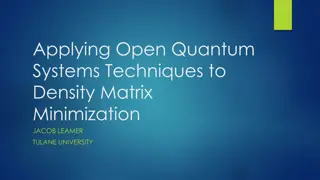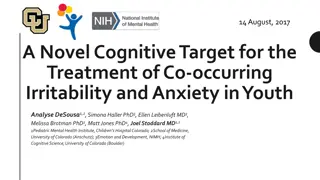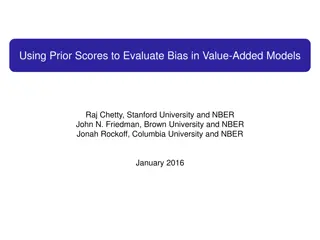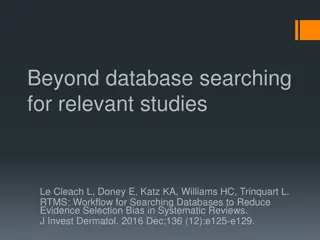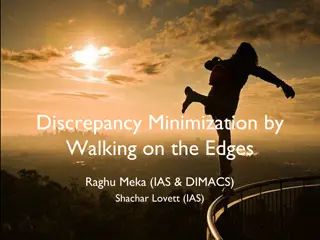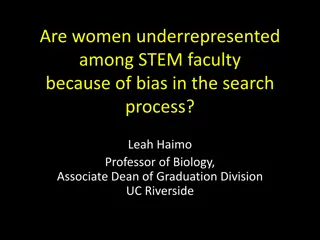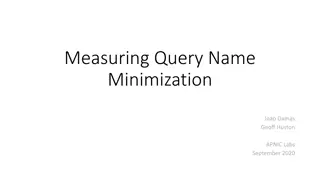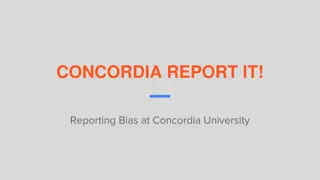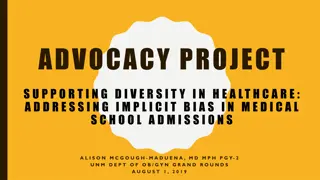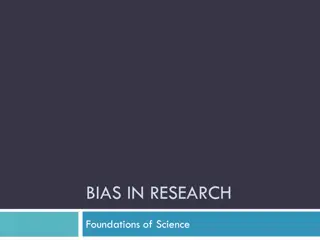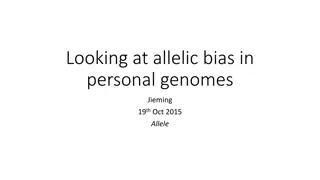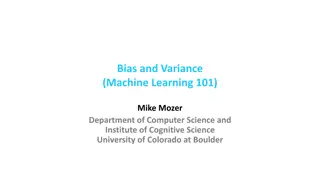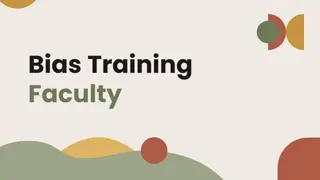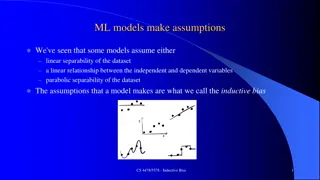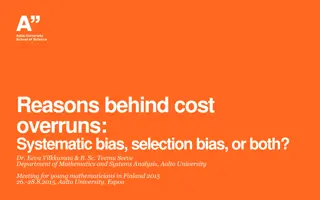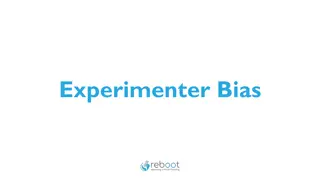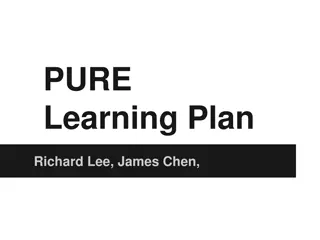Understanding Culture, Identity, Bias, and Diversity in the Workplace
This presentation highlights the importance of understanding culture, identity, bias, and their impacts in the workplace. Through courageous conversations and diversity training, participants learn to unpack implicit bias, combat bias, and develop teamwork skills. The session emphasizes staying enga
0 views • 19 slides
Unconscious Bias
Delve into the realm of diversity, equity, and inclusion through an interactive workshop focused on understanding unconscious bias, reducing bias in a safe space, intentional application in clinical settings, and successful interactions with diverse colleagues and patients. Engage in thought-provoki
1 views • 29 slides
Understanding and Avoiding Bias in Evidence-Based Responses
Recognizing bias in oneself and others is crucial when collecting evidence. Different types of bias, such as confirmation bias, can influence decisions and behaviors significantly. By exploring our own thinking and accessing curated resources to learn about bias, we can develop a deeper understandin
1 views • 14 slides
Evaluating Gender Bias in BERTi: Insights on Large Language Models
This study delves into gender bias evaluation in BERTi, a large language model trained on South Slavic data. It explores issues in language modeling, the impact of social biases in artificial intelligence, and training processes of Large Language Models (LLMs). Additionally, it discusses how LLMs le
11 views • 16 slides
Recognizing Hidden Bias in the Workplace
In the workplace, hidden bias, also known as implicit bias, can significantly impact hiring, employment decisions, and overall workplace dynamics. Deloitte's 2019 State of Inclusion Survey revealed that a substantial percentage of workers experienced bias at least monthly. Hidden biases can be based
3 views • 18 slides
Investigating Bias and Conflict of Interest: Guidelines for Fair Adjudication
Explore the intricacies of bias and conflict of interest in investigations, learn how to identify and counteract them to ensure fairness in decision-making. Topics include understanding bias, detecting it, LGBTQ terminology, evidence collection, and remedial actions like recusal. Navigate the nuance
0 views • 21 slides
Overcoming Unconscious Bias in Talent Acquisition Process
Overcoming Unconscious Bias in Talent Acquisition Process emphasizes the importance of addressing unconscious bias in hiring practices through awareness and control. The content delves into defining unconscious bias, its impact on diversity, examples, and strategies for managing bias. The University
0 views • 19 slides
Optimization Techniques for Minimization Problems
Explore various minimization problems, from easy to insanely hard, and learn about finding global and local optima using approaches like bisection, Newton's method, and rationalization. Discover efficient methods such as the golden section and iterative approximation with Newton's method for optimiz
0 views • 17 slides
Understanding and Utilizing Bias in Legal Proceedings
Exploring the complexities of bias in legal settings, this content provides insights on identifying, addressing, and leveraging bias in litigation. From defining various forms of bias to strategies for cross-examination and case presentation, it equips legal professionals with practical knowledge to
0 views • 19 slides
Understanding Odds Ratio and Bias in Case-Control Studies
This educational material covers the essentials of odds ratio and bias in case-control studies, including how to construct a 2x2 table, calculate odds ratio, define bias, and interpret results. A specific case study on pesticide exposure and cancer is presented to illustrate these concepts. Readers
2 views • 20 slides
Types of Bias in Epidemiological Studies
Bias in epidemiological studies can arise from misclassification of observations and exposures, leading to incorrect associations between variables. Observation bias, misclassification bias, and non-differential misclassification can impact the accuracy of study results, either minimizing difference
1 views • 11 slides
Understanding Diode Junction Biasing: Zero and Forward Bias Conditions
In the world of electronics, diode junction biasing plays a crucial role. This article delves into the concepts of zero and forward bias conditions for diodes. When a diode is zero-biased, no external potential energy is applied, while in forward bias, a specific voltage is introduced to initiate cu
0 views • 21 slides
Is Your Analytics Software Lying to You_ How to Spot and Correct Data Bias
Data bias can distort your analytics and lead to misguided decisions. In this blog, learn how to identify common signs of data bias, understand its impacts, and explore effective strategies to correct it. Enhance the accuracy and reliability of your insights with practical tips and advanced tools, e
3 views • 8 slides
Exploring Algorithm Design Approaches with Dr. Jey Veerasamy
Discover a range of algorithm design approaches including quick-sort, merge-sort, divide and conquer characteristics, greedy approach, and solutions to various optimization problems such as petrol cost minimization, number of stops minimization, activity selection, and knapsack problem. Dive into th
0 views • 14 slides
Understanding Bias and Variance in Machine Learning Models
Explore the concepts of overfitting, underfitting, bias, and variance in machine learning through visualizations and explanations by Geoff Hulten. Learn how bias error and variance error impact model performance, with tips on finding the right balance for optimal results.
0 views • 22 slides
Multi-Criteria Test Suite Minimization with Integer Nonlinear Programming
The study introduces a method for minimizing test suites using Integer Nonlinear Programming. It addresses regression testing challenges, such as managing large numbers of test cases, through Multi-Criteria Test Suite Minimization (MCTSM). The research explores the application of Integer Programming
0 views • 34 slides
Generalization of Empirical Risk Minimization in Stochastic Convex Optimization by Vitaly Feldman
This study delves into the generalization of Empirical Risk Minimization (ERM) in stochastic convex optimization, focusing on minimizing true objective functions while considering generalization errors. It explores the application of ERM in machine learning and statistics, particularly in supervised
0 views • 11 slides
Understanding Implicit Bias in Medical Education
Delve into the origins, forms, and manifestations of bias in clinical and medical education settings. Learn strategies to mitigate and address bias through a detailed exploration of terms like System 1 and System 2 thinking, implicit bias, race/racism, sexism, microaggressions, and more. Gain insigh
6 views • 27 slides
Understanding Bias in Sampling and Surveys
Bias in sampling and surveys can arise from undercoverage, nonresponse, and response bias. Even when samples are randomly selected, various factors can lead to inaccurate results. Researchers need to be aware of these biases and take steps to minimize them, such as testing surveys before full deploy
0 views • 8 slides
Understanding Transistor Bias Circuits for Linear Amplification
Transistor bias circuits play a crucial role in setting the DC operating point for proper linear amplification. A well-biased transistor ensures the signal variations at the input are accurately reproduced at the output without distortion. Various biasing methods such as Voltage-Divider Bias, Emitte
0 views • 7 slides
Advancements in Quantum Systems Techniques for Density Matrix Minimization
Discover the innovative methods and applications of open quantum systems techniques for density matrix minimization. Explore the motivation behind the research, early developments, purification processes, linear scaling potentials, Bloch's method intricacies, quantum channel algorithms, canonical de
0 views • 22 slides
Novel Cognitive Target for Treating Irritability and Anxiety in Youth
Research explores Hostile Interpretation Bias as a potential target for treating co-occurring irritability and anxiety in youth. The study investigates why this bias persists in irritable individuals and proposes Interpretation Bias Training as a treatment approach. Computational learning models are
0 views • 22 slides
Evaluating Bias in Value-Added Models Using Prior Scores
Outcome-based value-added (VA) models are commonly used to assess productivity in various fields. This study explores the use of prior scores to evaluate bias in VA estimates, focusing on the correlation between current teacher VA and lagged outcomes. The analysis highlights the sensitivity of balan
0 views • 38 slides
Managing Reporting Bias in Systematic Reviews - Strategies and Consequences
Reporting bias poses a significant threat to the accuracy of systematic reviews, with publication bias affecting up to 50% of trials. This bias distorts treatment effect estimates, leading to exaggerated outcomes. Strategies to mitigate reporting bias include searching bibliographical databases, exp
1 views • 17 slides
Understanding Discrepancy Minimization in Combinatorial Concepts
Explore the intriguing world of Discrepancy Minimization through concepts like walking on the edges, subsets coloring, arithmetic progressions, and more. Delve into fundamental combinatorial concepts and complexity theory to understand the significance of Discrepancy theory in various fields. Discov
0 views • 33 slides
Understanding Transition Bias and Substitution Models in Genetics
Transition bias and substitution models, explored by Xuhua Xia, delve into the concepts of transitions and transversions in genetic mutations, the causes of transition bias, the ubiquitous nature of transition bias in invertebrate and vertebrate genes, the mitochondrial genetic code, and RNA seconda
1 views • 25 slides
Gender Bias in STEM Faculty Recruitment
Research indicates that women are underrepresented among STEM faculty members, potentially due to bias in the search process. Studies show evidence of bias against women candidates in male-dominated fields like mechanical engineering, leading to lower hiring rates. Another study revealed bias in fac
0 views • 29 slides
Exploring Query Name Minimization in DNS Resolution
Delve into the world of query name minimization in DNS resolution, examining its adoption from the perspectives of end users, queries, and recursive resolvers. Understand the common resolver implementations and the techniques described in RFC 7816. Gain insights from user measurements and results fr
0 views • 18 slides
Addressing Bias-Related Incidents at Concordia University
The report discusses bias reporting at Concordia University, highlighting the importance of understanding and addressing bias-related incidents. It covers examples of bias, distinction between bias incidents and hate crimes, and strategies for response. Presenters from the Office of Multicultural En
0 views • 11 slides
Understanding Action and Perception through Minimization of Prediction Error
This talk by Karl Friston delves into how our interaction with the environment can be explained by the minimization of surprise or prediction error. It explores the role of predictive coding in perception and motor reflexes in action, showcasing phenomena like hierarchical brain messaging and percep
0 views • 25 slides
Addressing Implicit Bias in Medical School Admissions
Increased diversity in the healthcare workforce benefits health outcomes, but implicit bias can impact candidate selection in medical school admissions. This advocacy project aims to address implicit bias by developing training sessions for new members of the admissions committee at UNM SOM, focusin
0 views • 9 slides
Uncovering Bias in Research: Foundation of Science
Exploring the presence of bias in research, this compilation delves into various types of biases such as confirmation bias and fundamental attribution error. It also addresses the challenges of explaining behaviors rooted in biases and offers insights on reducing bias in the scientific process. Thro
0 views • 6 slides
Investigating Allelic Bias in Personal Genomes
This study delves into allelic bias in personal genomes, examining the influence of various factors such as sequencing datasets, removal of reads with allelic bias, and the impact on allele-specific single nucleotide variants (AS SNVs). The revised AlleleDB pipeline proposed includes steps for const
0 views • 6 slides
Understanding Bias and Variance in Machine Learning
Exploring the concepts of bias and variance in machine learning through informative visuals and explanations. Discover how model space, restricting models, and the impact of bias and variance affect the performance of machine learning algorithms. Formalize bias and variance using mean squared error
0 views • 21 slides
Enhancing Bias Training for Faculty at the University of Utah
Transform faculty training on bias at the University of Utah through engaging slides designed to raise awareness, combat implicit bias, and promote inclusivity. Empower educators to recognize and address bias in their teaching practices for a more equitable learning environment.
0 views • 21 slides
Understanding Inductive Bias in Machine Learning
Machine learning models rely on inductive bias, which are the assumptions made by algorithms to generalize from training data to unseen instances. Occam's Razor is a common example of inductive bias, favoring simpler hypotheses over complex ones. This bias helps algorithms make predictions and handl
0 views • 20 slides
Understanding Implicit Bias: Exploring Bias, Stereotypes, and Discrimination
Explore the concept of implicit bias through discussions about prior knowledge, feelings pre and post taking implicit association tests, and how this awareness can be applied beneficially in personal and classroom settings. Definitions of implicit bias, stereotypes, prejudice, and discrimination are
0 views • 21 slides
Understanding Cost Overruns in Projects: Systematic Bias vs. Selection Bias
Cost overruns in projects can be attributed to systematic bias, like optimism bias and strategic misrepresentation, or selection bias where projects with low estimated costs are more likely to be selected leading to underestimation. Mitigating these biases is crucial for accurate project budgeting a
0 views • 21 slides
Understanding Experimenter Bias in Research Studies
Experimenter bias occurs when researchers introduce their own biases into an experiment, potentially impacting the outcome. This bias can manifest in various ways, such as manipulating results or selecting participants who confirm preconceived notions. Through examples in studies about toddler sleep
0 views • 9 slides
Investigating Bias in Newspaper Articles through Natural Language Processing
The project, mentored by Jason Cho and advised by Professor Eric Meyer, focuses on automatic bias detection in newspaper articles. It involves recognizing similar article topics and detecting bias using tools like OpenNLP and Python NLTK. The endeavor aims to uncover words correlated with bias and a
0 views • 5 slides
